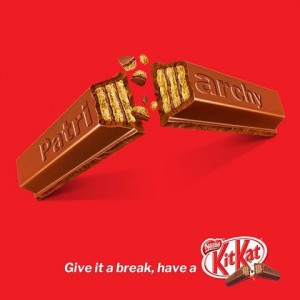Eileen Matthews has created advertisements using national brands including Kleenex and McDonalds. However, her ads aren’t meant to sell tissues or burgers – instead, they’re a form of art and activism.
Matthews, a Los Angeles-based freelance advertising copy writer, created the Instagram project “100 Days of Feminist Ads” on April 4, a form of creative endeavor in which a person commits to doing something for 100 days and shares their work on social media.
Matthews’ project releases daily art pieces styled as ads for well-known brands with a feminist twist. The ads tackle issues such as the pay gap and consent by reimagining different companies’ slogans and logos to share messages of equality. The project serves as a form of art activism that can impact millennial communities such as UCLA.
An ad for General Electric features a little girl in a superhero costume under the company’s logo and the words “There is no power stronger than girl power.”
Matthews had previously completed a different 100-day project, titled “100 Things That Should Die,” and felt its 100-day format served as a good way to share her work because of its commitment requirement and Instagram’s supportive community for artists completing their projects at the same time. The idea to use ads as feminist commentary came to Mathews a few months ago, in light of the current political climate. She said she sees the lack of feminist messaging in advertising as a missed opportunity for brands to use their power to improve society.
“When advertising is done in a smart way it doesn’t feel like an ad, it feels like a part of culture or it has a message that you can really identify with,” Matthews said.
The process of creating a completed piece differs for each ad. For some, Matthews starts with a tagline and tweaks the wording to change the message – for example, her Kay Jewelers ad changed the brand’s slogan “Every kiss begins with Kay” into “Every kiss begins with consent.”

Other ads are inspired by images or concepts. Matthews’ desire to create an ad about the glass ceiling inspired her Windex ad, a brand she chose because the product’s connection to glass allowed her to incorporate the idea, Matthews said.
Although the project is centered on feminism, some of Matthews’ ads also touch on issues of race – her Crayola ad states “Embrace every color.” Matthews felt it was important to reach a broader audience by emphasizing the intersectional nature of feminism, she said.
“Feminism is such a controversial word and it doesn’t need to be because what feminism encapsulates is equality,” Matthews said.
Matthews’ project represents the gradual broadening of feminist activism as it has recently expanded into pop culture, particularly because it provides opportunities for everyone to learn about the impact of women’s issues on everyday life, said UCLA communication studies lecturer Yoomi Chin.
“Having feminism or feminist ideas incorporated into popular culture or art broadens that terrain of the discourse of feminism,” Chin said. “If it’s restricted, confined to the academia, we really don’t get the full exposure.”
Matthews’ project also relates to growing consciousness and critique of advertising, Chin said. As time has gone on and social media usage has increased, the public has become more aware of the function of women within advertising because of easier access to complex feminist topics and discussions online.
“Women have always been the object of advertising,” Chin said. “But now, more feminist scholars and women (are) becoming more aware of how women’s bodies and gender and sex were always hypersexualized and commodified for many years.”
It is important to acknowledge the impact of advertising on the way people think and self-identify within society, said Amanda Stojanov, a Design | Media Arts graduate student and member of UCLA feminist art collective voidLab.
Advertising serves as an easily understandable medium and a starting point for complex conversations, she said.
For example, Matthews’ Oreos ad features the chocolate and vanilla sandwich cookie with the phrase “Almost nothing is black & white in this world.” The simple phrase could spark a conversation about the racial implications of the analogy and the use of socially conscious imaging within advertising, Stojanov said.
Using Instagram as a platform helps make the message more accessible to the new generation of activists, particularly because millennials are used to being vocal on social media, Chin said.
“It really provides that opportunity for the millennials to think about, to criticize, to evaluate gender roles in our society, especially women’s roles,” Chin said. “I see this as the millennial wave of feminism.”
Matthews is more than halfway through the project, which will end its 100 days on July 13, but she said she hopes that it can continue to inspire others by demonstrating nontraditional activism and action that politically motivated students and young adults can take.
“Young minds, it’s easy for us to feel like we can’t make a difference and yet we have the world at our fingertips,” Matthews said. “This is a way for me to use my talents and my creative thinking to send a message and to get in on this movement in a way that feels comfortable to me and in a way that matters to me.”
